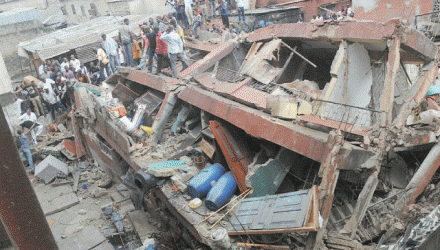News
Curbing incidences of building collapse


The spate of building collapse all over in the country should be a source of worry to all Nigerians. Every day brings with it gory news of such incidence in one part of the country or the other. Most times human lives are involved in such tragedies, including properties worth millions of naira. For long, Nigerians have watched in hapless resignation the inability of the authorities to curb this recurring nightmare. Two weeks ago, the Abu Naima Primary and Secondary School building in Jos, Plateau State collapsed killing 10 children who were receiving Islamic lectures. In the same week, seven people escaped death in Yaba area of Lagos State when a four-storey building under construction collapsed. In addition, another five people including a 13-year old girl were crushed to death after a two-storey building crumbled in Surulere area of Lagos State. The building, which was under construction crashed while it, rained.
Experts have attributed the increasing building collapse to variety of reasons that include the high cost of building materials and the absence of affordable alternative leading to the use of inferior materials. In addition, they posit that quacks have infiltrated the construction industry as they lack the expertise and international best practices for structural designs, among others. They also point accusing fingers at the deliberate downplay on professional advice, inappropriate planning, diversion from plan specifications, poor workmanship, lack of soil investigations, greed and desire to maximise profit. Others include illegal conversion of buildings, which often lead to structural deficiencies and flagrant disobedience to town planning regulations by developers and landlords.
We are therefore calling on the authorities and other stakeholders to intensify actions in order to reduce the increasing incidence of building collapse through passing relevant ordinances to tackle the menace. For this to succeed we advise that the town planning authorities be adequately staffed and equipped with professionals to ensure thorough supervision of buildings at all stages. Moreover, government at all levels should provide an enabling law for the training and effective control of artisans and craftsmen in the building industry.
In furtherance to this, clients should obtain approvals before they begin construction and in doing so must work with the approved drawings and specifications while any alterations must get approval before their implementations. It is time the National Assembly enacts law for the enforcement of the Nigerian National Building Code to ensure effective regulation of the activities. Such document should represent a compulsory requirement before anyone embarks on land development especially at medium and large-scales. We also urge the government to hasten action on the establishment of Soil Research Institute of Nigeria (SRIN) with zonal branches in response to major ecosystems in the country. The institute will be charged with the responsibility of soil resources inventory, characterisation and classification for matching them to engineering, architectural, aesthetic and environmental challenges in Nigeria.
Many accusations have been levelled against town planning officials for approving building permits to non-professional builders. Such corrupt practice has made the construction industry an all comers affair. Through the Nigerian Standard Organisations (SON), government must be ready to combat the importation of sub-substandard and unwholesome building materials into the country. Reinforcing and effectively implementing its Conformity Assessment Programme (SONCAP) can achieve this. This will not only protect Nigerian consumers from unsafe and sub-standard building materials, but also discourage the use of inferior materials for construction.
Lastly, government must be ready to tackle the complicated problem of building neglect by the populace generally. The way to tackling the problem should be through legislation, enforcement, support and assistance, publicity and public education.
The post Curbing incidences of building collapse appeared first on Daily Times Nigeria Newspaper.




 Davido's Net Worth & Lifestyle
Davido's Net Worth & Lifestyle 
